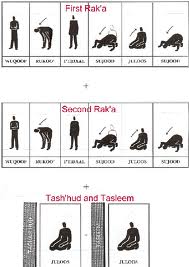As Salam Alaikum friends. Hope your day is going well and that you are blessed.
Today we’ll learn about the second pillar in Islam which is Salat or “prayer”. Our days and nights are centered around prayer. We have 5 obligatory prayers each day and may pray more often and make supplications as much as possible if we wish. The more prayers the more rewards!
Allah has commanded us to pray because it purifies us, keeps Him in our hearts and on our tongue, curbs desires and elevates the mind to seek Him. It bring us closer to him and to our deen.
Islams 5 obligatory prayers are Fajr (morning), Dhur (afternoon), Asr (evening), and Isha (night). The times are dependent on where you live , time zone, etc. Muslims face front towards the Kaba in Mecca to pray because it has been commanded by Allah and its sunnah as our prophet did this as well. The direction will also depend on where you live. For example, I face northeast towards the Kaba.
Before prayer, it is necessary to cleanse oneself with a purification ritual called “wudu”. Wudu is the ritual cleaning of certain areas of your body before prayer and is needed so your prayer will be accepted. Basically what you do is first have your intention to cleanse for prayer, say Bis-Mi-lah (in the name of God), and start the ritual. Its as follows:
1. Wash both hands with water three times to wrist.
2. Wash out mouth with water three times.
3. Take water into nose by right hand, snort it out and wipe with left hand three times.
4. Wash face with water three times.
5. Start with right arm and wash right and left arms to elbow three times with water.
6. Take water and wipe front to back over hair 1 time.
7. With water, clean out the ear area with fingers and behinf ear with thumb 1 time.
8. Starting with right foot, wash feet with water to ankle 3 times.
Now you’re done! It actually is pretty quick, it just looks like a long list but it takes less than 5 minutes to perform.
Now you’re ready to pray, but first you must put those prayer clothes on! For women, a long dress or abayba/jilbab, is necessary and must be long enough to cover arms to wrists and down to feet. You may also wear pants with a long shirt that covers your bottom. I usually wear a long dress with pants under if going to the mosque. You also need to cover your hair with a head scarf and that includes neck, chest and ears. Men can wear a regular shirt, without logos on them and pants or shorts that cover below knees. Don’t forget to make sure the clothes are clean and free from dirt and / or bodily excrement’s including urine, blood, etc.
Things to note: Please recite only the Arabic portions during praying. Phrases are repeated at least twice in the audio files for your convenience. Recite the phrases only once during praying, unless otherwise mentioned. Some common Arabic Terms used: Surah = A Chapter of the Quran, Dua = Supplication
Ok NOW you’re ready to pray lol. Here’s how it goes…
1. Face the Kaba in Mecca…depends on your location as to which direction you will face.
2. Standing, you will start the prayer raising both hands up close to your ears and say “Allahu Akbar” (God is Most Great).
3. Then put one hand on the top of the other hand between your chest and upper stomach, and start reciting surah “al fatiha”, say “ameen” once you finish it, and then start reciting another small surah.
4. Once you finish reciting raise your hands up to the ears, saying “Allahu Akbar.” Bow (your hands on your knees, back straight, your face toward the ground, saying three times, “Subhana rabbiyal adheem” (Glory be to my Lord Almighty). This position is called (ruku’).
5. Rise back to standing while saying “Sami’a Allahu liman hamidah, Rabbana wa lakal hamd” (God hears those who call upon Him; Our Lord, praise be to You).
6. Raise hands up, saying “Allahu Akbar” then descend to the ground (see photo), while your face on the ground say three times “Subhana Rabbiyal A’ala” (Glory be to my Lord, the Most High). This position is called “sujud”
7. Rise to a sitting position saying “Allahu Akbar.”
8. Then prostrate back on the ground (this is the second time you do it), while your face on the ground say three times “Subhana Rabbiyal A’ala”
This will conclude the first “rak’a”. Now to start the second “raka’a” you simply need to repeat steps from 2 to 8. Note that at the end of your second “rak’a” you will have to add step 9, which is:
9. Rise to a sitting positition, remain sitting and recite the first part of the Tashahhud in Arabic: “Atta-hiyyatu lillahi was-salawatu wat-tayyibatu As-salamu ‘ala an-Nabiyy wa rahmat-ullahi wa barakatuhu As-salamu ‘alaina wa ‘alaa ‘Ibaadillah-is-salihin. Ash-hadu-al-la-ilaha illAllahu wa ash-hadu anna Muhammadan ‘abduhu wa Rasuluh”. Note that while reciting “Ash-hadu-al-la ilaha illaAllahu …” one should move the index finger of the right hand in a small circle like you’re drawing a circle on the sand beach with your index while the hand is still on the thigh. Only the index should be moving, the rest of the fingers and hand don’t have to move.
10. If the prayer is to be longer than 2 “rak’as”, then add the same steps from 2 to 8 depending on how many “rak’as” you have to perfom, for example if you have to make 4 “rak’as” then you will have to add steps 2 to 8 two more times (which means 4 times in total). Then finally add the step number 9 again (basically after each two “rak’as” the step #9 is required).
11. To end your prayer, while still sitting, turn your face to the right and say “Assalamu alaikum wa rahmatullah” (Peace be upon you and God’s blessings), and turn to the left and say the same “Assalamu alaikum wa rahmatullah”. And that’s how you finish your prayer, easy!
Main prayers of the day:
1st prayer (Fajr) = 2 Rakats
2nd prayer (Dhuhr) = 4 Rakats
3rd prayer (Asr) = 4 Rakats
4th prayer (Magrib) = 3 Rakats
5th prayer (Isha) = 4 Rakats
So there you have it!! The Muslim prayer 🙂 I hope this was helpful to you and if I have left anything out or forgot to mention anything. I apologize. Please feel free to ask or comment on this in comment section!
As Salam Alaikum, Amani xoxo
May Allah bless you with happiness, health and safety. Ameen 🙂


